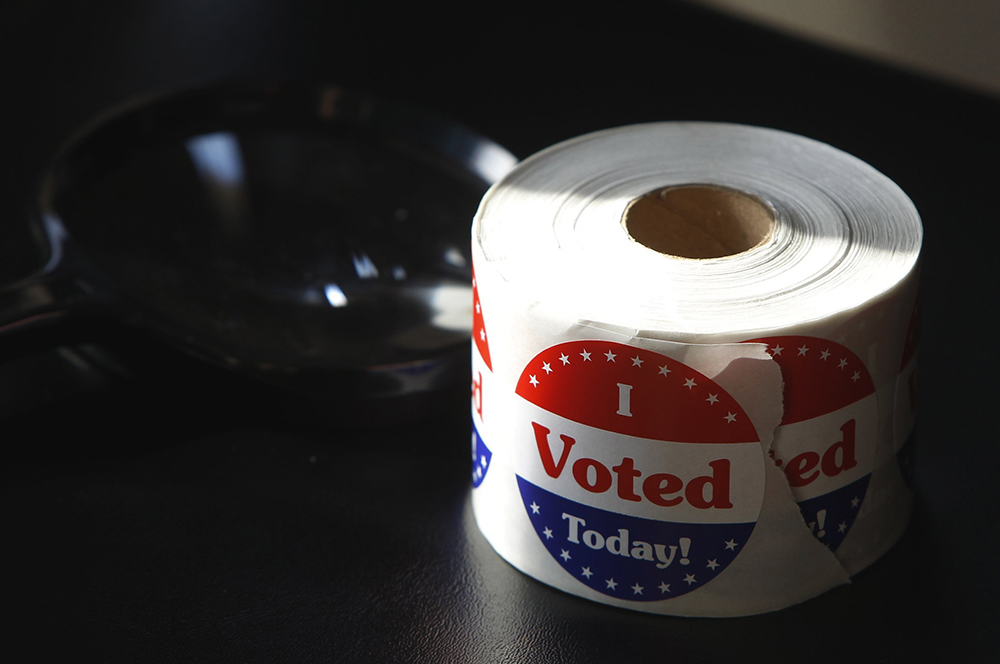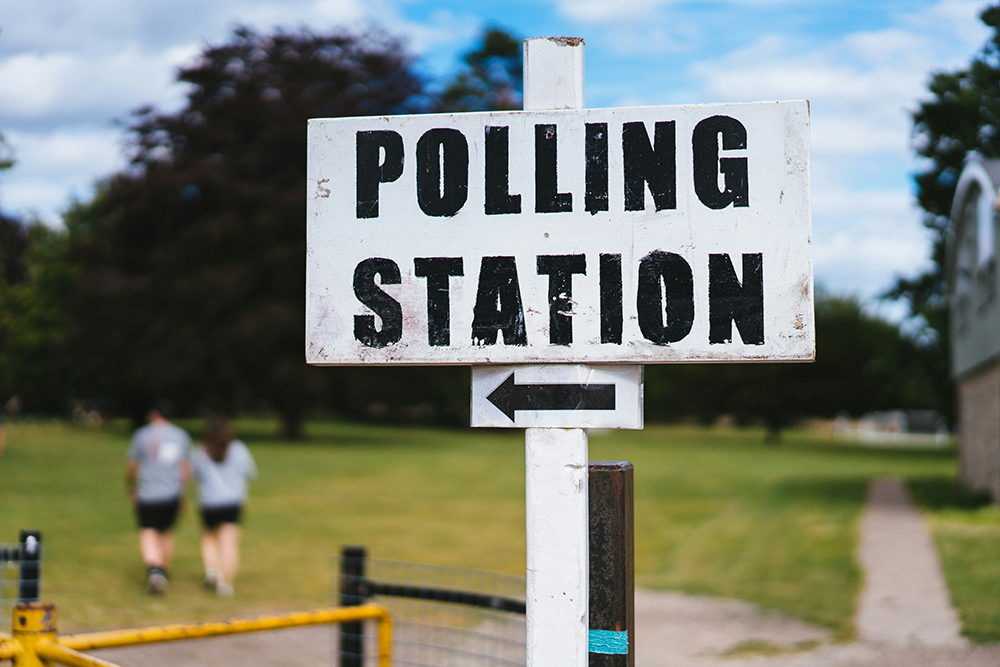
A file photo shows a roll of "I Voted Today" stickers at a polling station in Washington. (OSV News/Reuters/Gary Cameron)
We are now five days away from the 2024 election. The presidential race is statistically tied, according to national polls, and it has been now for weeks, making this one of the closest election competitions in history with commentators talking about "coin tosses," "jump balls" and "knife's edges."
That this race is so close is confounding to many people, me included. Once President Joe Biden announced his decision not to seek reelection and backed Vice President Kamala Harris for the Democratic ticket, the clear contrast between former president Donald Trump and Harris couldn't be starker.
One candidate is a convicted felon, while the other is a former prosecutor and attorney general of California.
One candidate is almost 80-years-old and showing signs of what observers are calling mental decline, while the other is still middle aged and not only demonstrates mental acuity but also decorum appropriate to the highest office in the land.
One candidate's closing message centers on racist, misogynist, xenophobic and antisemitic sentiments riddled with falsehoods and misinformation, while the other is warning against fascism and other threats to democracy, cautioning the American people to focus on moving forward toward a better tomorrow.
Advertisement
It's not immediately clear which message, or which candidate for that matter, will win next week. Regardless of one's political persuasion or candidate of choice, the deadlock between these two radically different candidates is sure to induce anxiety in the closing days of the election. I know that I'm starting to feel unsettled and anxious given the stakes of this election.
This led me to look back at what I had written in my columns before the 2016 and 2020 presidential elections. In both cases, as with this column, I was on deadline before the election took place. And in light of the present circumstances, I was curious about what I was thinking and saying eight and four years ago.
In 2016, when I was a columnist at America magazine, I had a deadline shortly before the election for a column scheduled to be published the week after the election. In that column, I tried to look ahead to what happens after the votes are cast and counted. I asked: "What will happen after the election? Can anything be done to repair the divisions that have been so sharply drawn? How might we stem the seemingly endless tide of fear and hatred and anger?"
I argued that, despite the seemingly unprecedented turmoil and vitriol of the 2016 general election, "Women and men of faith have resources and the responsibility to try to do something proactive, encouraging all people in these difficult times." I pointed to the prophetic wisdom of St. Francis of Assisi, who believed that to be peacemakers and reconcilers was essential to being authentically and fully human. I believed that there was a chance, however the election turned out, for us to maintain our human decency and some society cohesion.
But then the Trump administration took office and the next four years often pushed the boundaries of legality and human decency.
Regardless of one's political persuasion or candidate of choice, the deadlock between these two radically different candidates is sure to induce anxiety in the closing days of the election.
On the eve of the 2020 presidential election, I wrote a column for NCR that was both a little grimmer and yet still hopeful. Drawing on Pope Francis' then-newly published encyclical letter Fratelli Tutti, I argued that what we needed moving forward — whatever the election outcome — was an effort to avoid cynicism (something that grew rampant during the Trump years), preserve memory (especially "dangerous memories," as the late theologian Fr. Johann Baptist Metz put it), and restore a sense of our shared humanity.
Now on the cusp of yet another historic and consequential election, I find myself wondering how to think about the present and the future yet again. As in 2020, I want to resist the temptation to cynicism that is too easily adopted in the face of a presidential race that should not be this close. And yet, we can see cynical responses all around, from pundits on television to neighbors, friends and family members.
The preservation of memory, that necessary safeguarding of facts and truths about reality required to live honestly and productively, has seemingly gone out the window. How quickly people forget about what life was like under the first Trump administration, especially when unexpected crises arose like the global pandemic.
More disturbing than that is the whitewashing of the January 6 riots that led to deaths at the U.S. Capitol in what was a genuine threat to democracy and national security. This dangerous memory has been erased or repressed in the minds of millions of people.
Supporters of President Donald Trump gather in front of the U.S. Capitol in Washington Jan. 6. (CNS/Reuters/Stephanie Keith)
And as for the restoration of a sense of our shared humanity, that feels increasingly like an impossible task today. The dehumanizing rhetoric by Trump on the campaign trail and the permission structure it has given to his supporters to do likewise at the local level, is as deeply disturbing as it is unchristian. Earlier this month, even before his racist and misogynist remarks at his Madison Square Garden appearance last weekend, Trump's speeches and descriptions of marginalized populations was likened to that of Hitler and other dictators by the journalist Anne Applebaum in The Atlantic.
So where does that leave us with less than a week until the voting ends and the likely post-election slow counting and recounting and litigating begins?
It's hard not to be pessimistic. If Harris wins, one can certainly assume that intelligent, mature and qualified adults will be at the helm of the executive branch of the U.S. government. But that won't mean that tensions will dissipate, or Trump will surrender without a fight (he's almost sure to do everything he can to disrupt the peaceful transition of power, as he and his followers did after the 2020 election).
If Trump wins, one can certainly assume that those appointed to the highest positions in the executive branch will not be judged on their competence, experience or decorum, but solely on their willingness to do whatever Trump says regardless of its legality or ethical valence. Loyalty — and blind loyalty at that — is the only virtue Trump has touted as meaningful to him, which means most of the so-called "grownups" that were allegedly in the room the first time around will not be present to offer any restraint this time.
While I hate to admit it, the possible consequences of either outcome tempt me to think in apocalyptic terms. Not in the sense that we will immediately be dragged into "World War III" or that our society will break into a second American Civil War.

(Unsplash/Phil Hearing)
What I mean is that it can be difficult to find hope in the present and so I begin to lean on my Christian belief in the eschatological future. The problem with that is it can become a form of spiritual escapism, a sort of Christian Pollyannaish delusion that seeks relief from the present by placing all one's hopes on the future when everything will be just fine.
But that is not authentic Christian hope, which demands something of us in the present knowing that God draws near to us always, including in difficult and uncertain times.
The Second Vatican Council makes clear in its Pastoral Constitution on the Church in the Modern World, Gaudium et Spes, that the primary purpose of civil governments is the protection and promotion of the common good. Furthermore, it states clearly that those who disregard our earthly responsibilities to our neighbors, especially the most vulnerable, because they have a distorted focus on the next life, are not living out their Christian faith appropriately. "They are mistaken who, knowing that we have here no abiding city but seek one which is to come, think that they may therefore shirk their earthly responsibilities."
We cannot simply give up and naively hope for something better down the road. In these final days, it is not just important but essential to vote and to vote for the common good. And when the ballots are counted and the winner declared, we must continue to work for the common good for failure to do so is to shirk our earthly responsibilities.







